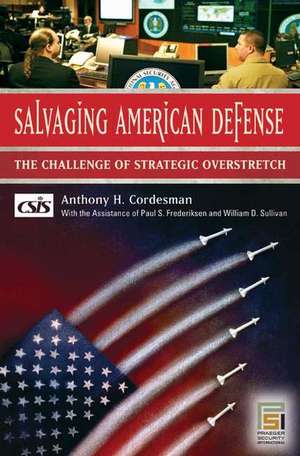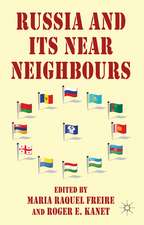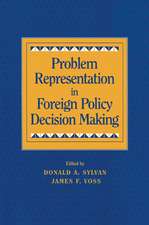Salvaging American Defense: The Challenge of Strategic Overstretch: Praeger Security International
Autor Anthony H. Cordesmanen Limba Engleză Hardback – 29 apr 2007 – vârsta până la 17 ani
Din seria Praeger Security International
- 18%
 Preț: 334.19 lei
Preț: 334.19 lei - 8%
 Preț: 335.53 lei
Preț: 335.53 lei - 34%
 Preț: 376.10 lei
Preț: 376.10 lei - 46%
 Preț: 443.64 lei
Preț: 443.64 lei - 29%
 Preț: 240.11 lei
Preț: 240.11 lei - 8%
 Preț: 304.56 lei
Preț: 304.56 lei - 34%
 Preț: 373.82 lei
Preț: 373.82 lei - 19%
 Preț: 412.79 lei
Preț: 412.79 lei - 19%
 Preț: 338.42 lei
Preț: 338.42 lei - 18%
 Preț: 335.62 lei
Preț: 335.62 lei - 27%
 Preț: 377.35 lei
Preț: 377.35 lei - 27%
 Preț: 376.75 lei
Preț: 376.75 lei - 18%
 Preț: 336.46 lei
Preț: 336.46 lei - 18%
 Preț: 321.73 lei
Preț: 321.73 lei - 18%
 Preț: 320.50 lei
Preț: 320.50 lei - 18%
 Preț: 320.50 lei
Preț: 320.50 lei - 18%
 Preț: 321.35 lei
Preț: 321.35 lei - 24%
 Preț: 420.54 lei
Preț: 420.54 lei - 14%
 Preț: 335.99 lei
Preț: 335.99 lei - 18%
 Preț: 355.82 lei
Preț: 355.82 lei - 18%
 Preț: 319.83 lei
Preț: 319.83 lei - 18%
 Preț: 334.28 lei
Preț: 334.28 lei - 32%
 Preț: 354.48 lei
Preț: 354.48 lei - 14%
 Preț: 335.14 lei
Preț: 335.14 lei - 38%
 Preț: 405.98 lei
Preț: 405.98 lei - 40%
 Preț: 571.34 lei
Preț: 571.34 lei - 18%
 Preț: 321.85 lei
Preț: 321.85 lei - 18%
 Preț: 323.25 lei
Preț: 323.25 lei - 18%
 Preț: 253.28 lei
Preț: 253.28 lei - 40%
 Preț: 571.50 lei
Preț: 571.50 lei - 14%
 Preț: 333.72 lei
Preț: 333.72 lei - 18%
 Preț: 301.73 lei
Preț: 301.73 lei - 19%
 Preț: 352.96 lei
Preț: 352.96 lei - 26%
 Preț: 387.80 lei
Preț: 387.80 lei - 18%
 Preț: 302.77 lei
Preț: 302.77 lei - 14%
 Preț: 333.91 lei
Preț: 333.91 lei - 17%
 Preț: 325.80 lei
Preț: 325.80 lei - 24%
 Preț: 338.58 lei
Preț: 338.58 lei - 34%
 Preț: 414.73 lei
Preț: 414.73 lei - 18%
 Preț: 354.30 lei
Preț: 354.30 lei - 29%
 Preț: 254.29 lei
Preț: 254.29 lei - 18%
 Preț: 354.11 lei
Preț: 354.11 lei - 18%
 Preț: 334.38 lei
Preț: 334.38 lei - 14%
 Preț: 302.68 lei
Preț: 302.68 lei - 18%
 Preț: 322.97 lei
Preț: 322.97 lei - 27%
 Preț: 376.50 lei
Preț: 376.50 lei - 27%
 Preț: 322.81 lei
Preț: 322.81 lei - 27%
 Preț: 382.91 lei
Preț: 382.91 lei - 18%
 Preț: 320.87 lei
Preț: 320.87 lei
Preț: 384.51 lei
Preț vechi: 523.51 lei
-27% Nou
Puncte Express: 577
Preț estimativ în valută:
73.57€ • 76.82$ • 60.89£
73.57€ • 76.82$ • 60.89£
Carte tipărită la comandă
Livrare economică 04-18 aprilie
Preluare comenzi: 021 569.72.76
Specificații
ISBN-13: 9780275992576
ISBN-10: 0275992578
Pagini: 488
Dimensiuni: 156 x 235 x 43 mm
Greutate: 0.91 kg
Editura: Bloomsbury Publishing
Colecția Praeger
Seria Praeger Security International
Locul publicării:New York, United States
ISBN-10: 0275992578
Pagini: 488
Dimensiuni: 156 x 235 x 43 mm
Greutate: 0.91 kg
Editura: Bloomsbury Publishing
Colecția Praeger
Seria Praeger Security International
Locul publicării:New York, United States
Notă biografică
Anthony H. Cordesman holds the Arleigh A. Burke Chair in Strategy at the Center for Strategic and International Studies, and is an analyst and commentator for ABC News. He has written extensively on energy and Middle Eastern politics, economics, demographics, and security. He has served in a number of senior positions in the US government, including the Department of Energy, and several assignments in the Middle East.Paul S. Frederiksen has been a consultant to the Post-Conflict Reconstruction Project (PCR) at CSIS where he worked on a World Bank-funded project devising strategies to assess and develop governance and state capacity for the Government of Iraq. Prior to joining PCR, Frederiksen spent a year as a defense policy analyst with the CSIS Arleigh A. Burke Chair in Strategy, conducting research and writing on a wide range of U.S. defense topics including the Iraq War, defense transformation, stabilization and reconstruction programs, and the interagency process. He received his B.A. magna cum laude in political science and economics from Washington University in St. Louis where his thesis won the Center for the New Institutional Social Sciences Award. He subsequently completed his Master's degree in politics as a MacCracken Fellow at New York University where he focused on humanitarian interventions in civil wars.William D. Sullivan is a research associate at the Arleigh A. Burke Chair in Strategy at the Center for Strategic & International Studies. He joined CSIS in 2004 with the Eastern Europe Project to study narcotics and weapons trafficking in the Western Balkans. In 2005, Sullivan joined the CSIS International Security Program to focus on a Department of Defense initiative to reorganize the U.S. military's reserve components. He currently works on Middle East energy and security strategies as well as domestic and overseas U.S. defense issues. Prior to joining CSIS, Sullivan spent three years at a portfolio advisory and publishing group in McLean, Virginia. He is a frequent speaker and radio commentator on his areas of expertise, and is published on both financial and geopolitical topics. Sullivan is a graduate of the University of Virginia with degrees in politics and English literature.
Recenzii
Asserting that the United States needs to adapt to the long war against international terrorism, the authors argue that it must do this at same time that it must cope with a host of other issues. They identify ten major types of challenge that require attention over the coming decade and offer their judgments on the available options. Those challenges include the strain of the Iraq occupation on US armed forces, determining the level of financial burden of national defense, meeting the needs of the active and reserve military, measuring the extent that the US has too few forces or forces in the wrong areas, determining what kind of force transformation is affordable and needed, abandoning unaffordable force transformation efforts, creating effective national security interagency capability, creating effective local (Iraqi) forces, reshaping alliance relationships, and finding ways to achieve policy maker accountability.

















